外研版高中英语必修3 Module 3 The Violence of Nature grammar---直接引语和间接引语教学课件 (共29张)
文档属性
| 名称 | 外研版高中英语必修3 Module 3 The Violence of Nature grammar---直接引语和间接引语教学课件 (共29张) | 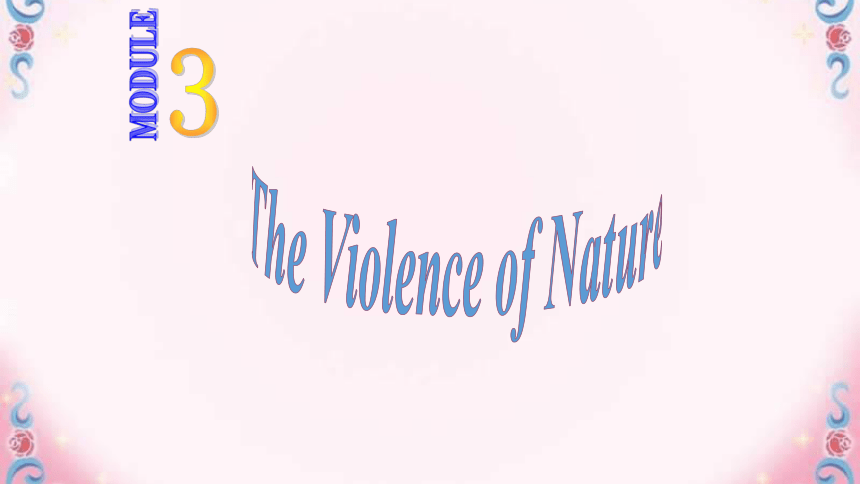 | |
| 格式 | zip | ||
| 文件大小 | 205.7KB | ||
| 资源类型 | 教案 | ||
| 版本资源 | 外研版 | ||
| 科目 | 英语 | ||
| 更新时间 | 2019-03-05 15:57:03 | ||
图片预览

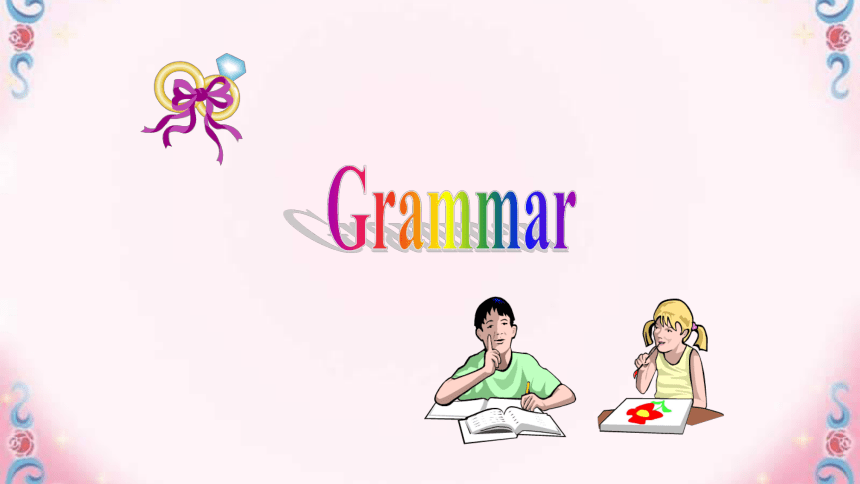
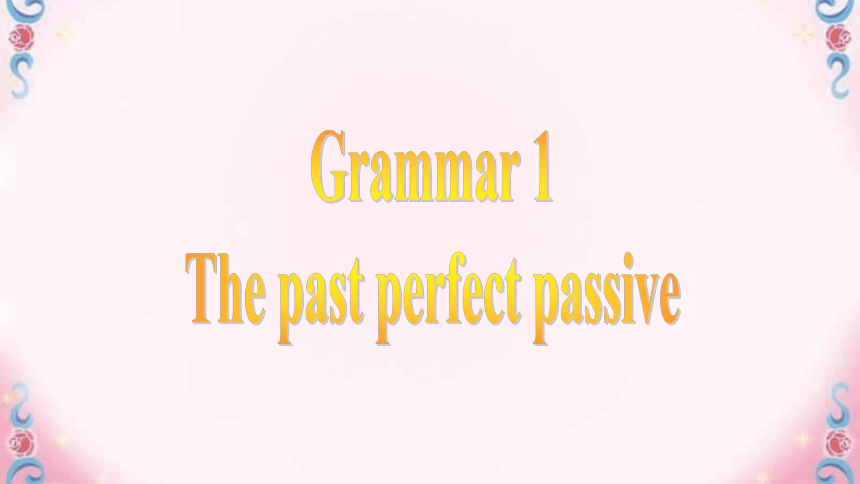
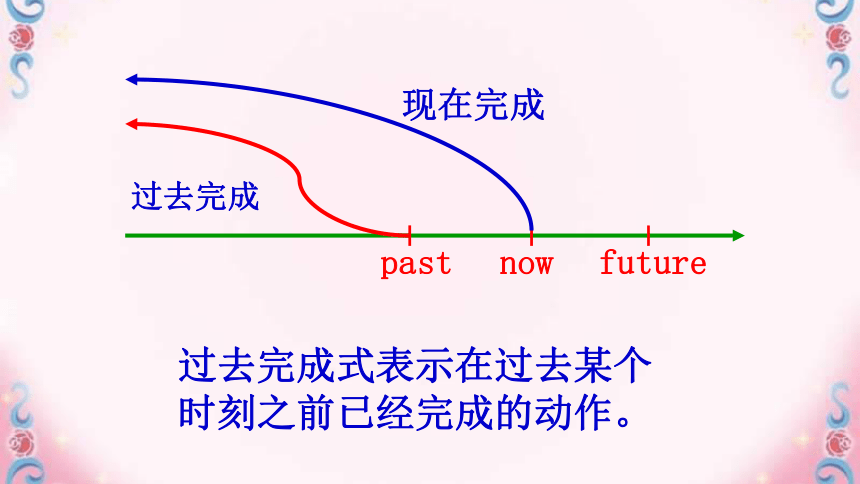
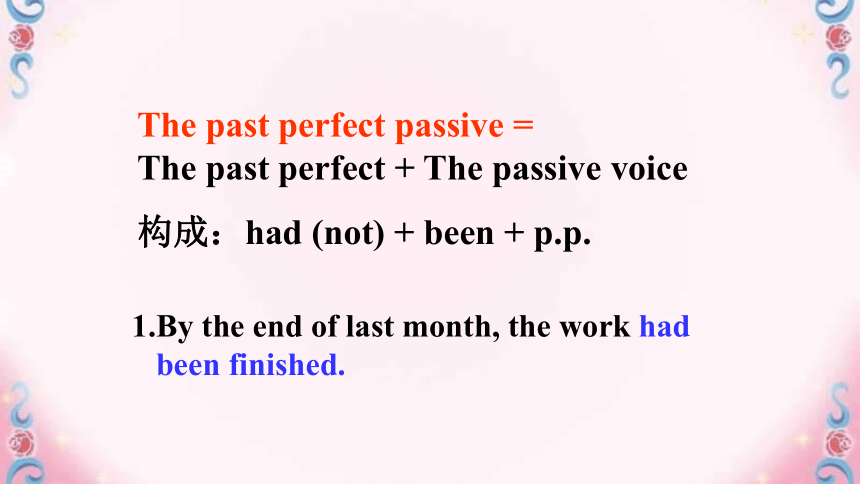
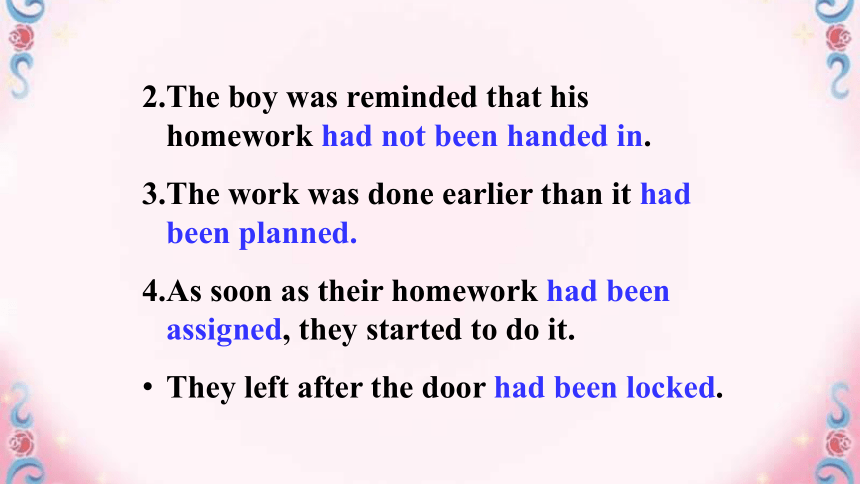
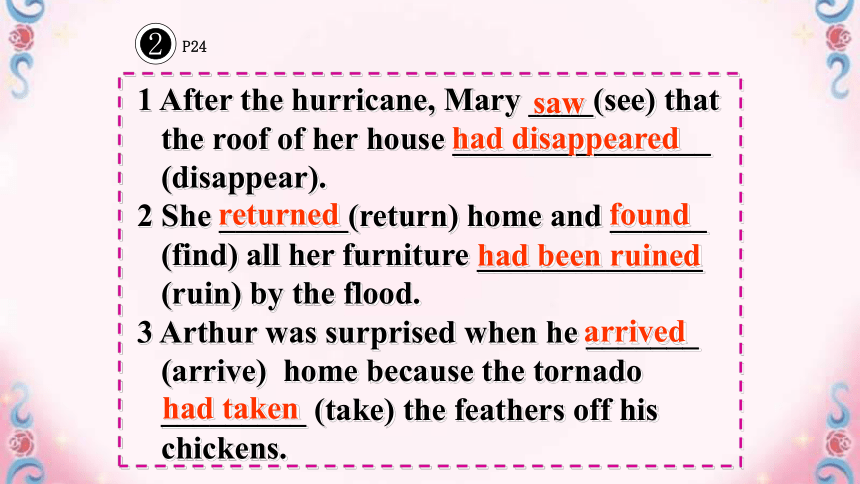
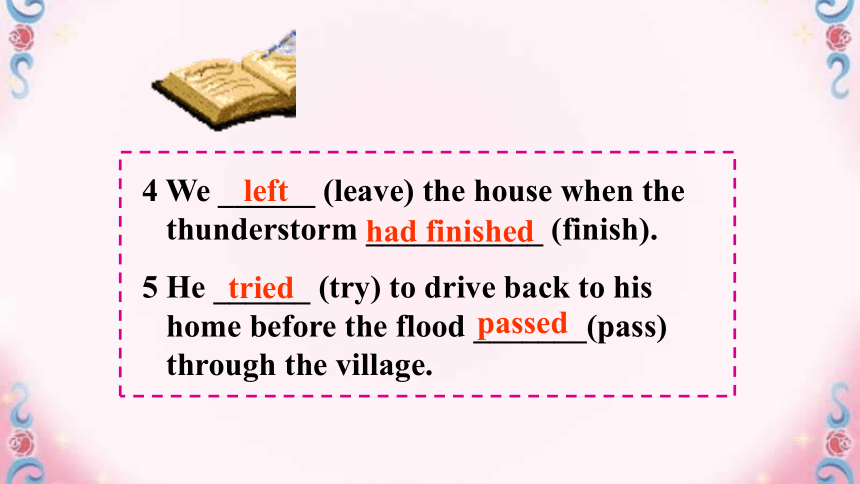
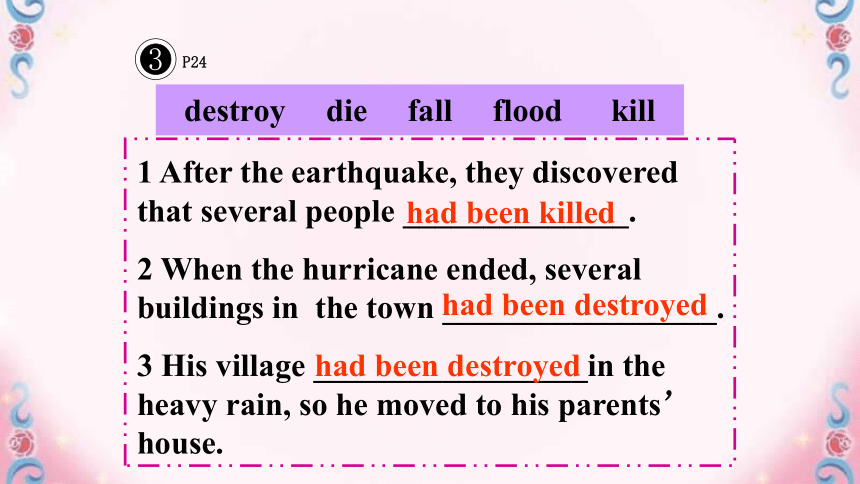
文档简介
课件29张PPT。MODULE3The Violence of NatureGrammarGrammar 1
The past perfect passivenowpastfuture过去完成现在完成过去完成式表示在过去某个时刻之前已经完成的动作。By the end of last month, the work had been finished.The past perfect passive = The past perfect + The passive voice
构成:had (not) + been + p.p.2.The boy was reminded that his homework had not been handed in.
3.The work was done earlier than it had been planned.
4.As soon as their homework had been assigned, they started to do it.
They left after the door had been locked.1 After the hurricane, Mary ____(see) that the roof of her house ________________ (disappear).
2 She ________(return) home and ______ (find) all her furniture ______________ (ruin) by the flood.
3 Arthur was surprised when he _______ (arrive) home because the tornado _________ (take) the feathers off his chickens.sawhad disappearedreturnedfoundhad been ruinedarrivedhad takenP24 4 We ______ (leave) the house when the thunderstorm ___________ (finish).
5 He ______ (try) to drive back to his home before the flood _______(pass) through the village.
lefthad finishedtriedpasseddestroy die fall flood kill1 After the earthquake, they discovered that several people ______________.
2 When the hurricane ended, several buildings in the town _________________.
3 His village _________________in the heavy rain, so he moved to his parents’ house.had been killedhad been destroyedhad been destroyedP24 destroy die fall flood kill4 When she woke up, she found that her house __________________ by the thunderstorm.
5 Arthur was unhappy because some of his animals _________. had diedhad been destroyed高考链接1. At the end of the meeting, it was announced that an agreement ______. (2007江苏)
A. has been reached B. had been reached C. has reached D. had reached
2. John had to have his car repaired in a garage because it seriously. (2007上海春)
A. damaged B. was being damaged
C. had damaged D. had been damaged Grammar 2
Indirect speechHe said, “I’m still working because there is a lot to do.”He said that he was still working because there was a lot to do.引述别人的话叫直接引语;“……”
用自己的话转述别人的话叫间接引语。1. 直接引语变为间接引语的时态变化:一般过去时过去完成时过去将来时过去完成时过去进行时过去完成时2. 指示代词、时间状语、地点状语的变化thatthosethenthat daythat week, month…the week beforetwo days beforethe next weekthere1. 引用的句子是陈述句时,间接引语可 以用宾语从句的形式。1. She said, “I like English very much.”
→She said she liked English very much.
2. Betty said, “I’ll be waiting for your call.”
→Betty said that she would be waiting for my call.1. The teacher asked me, “Do you like English?”
→ The teacher asked me if I liked English.
2. He asked, “You’ve already finished your homework, haven’t you?”
→He asked if/whether we had already finished our homework.2. 直接引语为一般疑问句、反意疑问句或选择疑问句,可以改成以if / whether + 陈述句的形式。3. He asked me, “Do you want to stay at a hotel or at my home?”
→He asked me whether I wanted to stay at a hotel or his home.
4. She asked us, “You’re from the same city, aren’t you?”
→She asked whether we came from the same city.3. 引语为特殊疑问句时,可以保留疑问词,后跟陈述句。1. He asked me, “Where are you going?”
→He asked me where I was going.
2. She asked him, “Whom do you want to see?”
→She asked him whom he wanted to see.4. 引用祈使句时,间接引语用不定式,主句动词根据句子意义,可用ask, want, tell, order, promise, advise等词代替。1. The teacher said to the student, “Don’t be late again.”
→The teacher told the student not to be late again.
2. “Wake him up,” she said to me.
→ She told me to wake him up.5. 过去时如有表示具体年份的状语,不必改变时态。 “I was born in 1980,” Julia said.
→Julia said that she was born in 1980.6. 引语中含有must, should, would等情态动词时,不必改变时态。 “You should be back by six,” she said.
→She said I should be back by six.7. 当引用的事情为永恒的真理、依然存在的事情时,可以不必改变时态。1. He said that the earth rotates around the sun.
2. He said that the train leaves at 6:30.1. He asked ________ for the computer.
A. did I pay how much
B. I paid how much
C. how much did I pay
D. how much I paid
2. “Have you seen the film?” he asked me.
→He asked me _______.
A. had I seen the film
B. have I seen the film
C. if I have seen the film
D. whether I had seen the film3. “Please close the window,” he said to me.
→He ______ me _____ the window.
A. said to; to close B. told to; closing
C. asked ; to close D. said to; please close
4. “I am a teacher,” Jack said.
→He said _________.
A. that I am a teacher B. I was a teacher
C. that he is a teacher D. he was a teacher5. He said, “Mother, the boy is very naughty.”
→He _____ very naughty.
A. said his mother that the boy was
B. said to his mother that the boy is
C. told his mother that the boy was
D. spoke to his mother that the boy was6. “You’ve already got well, haven’t you?” she asked.
→She asked ________.
A. if I have already got well, hadn’t you
B. whether I had already got well
C. have I already got well
D. had I already got well.7. He asked , “Are you a Party member or a League member?”
→He asked me _________.
A. am I a Party member or a League member
B. was I a Party member or a League member
C. whether I was a Party member or a League member
D. whether was I a Party member or a League member.8. He asked, “How are you getting along?”
→He asked _______.
A. how am I getting along
B. how are you getting along
C. how I was getting along
D. how was I getting along
9. He asked me ________ with me.
A. what the matter is
B. what wasthe matter
C. what’s the matter
D. what the matter was10. He said, “Don’t do that again.”
→He _____ me _______ that again.
A. said to me; not to do
B. said to me; don’t do
C. told me; don’t do
D. told me; not to do
The past perfect passivenowpastfuture过去完成现在完成过去完成式表示在过去某个时刻之前已经完成的动作。By the end of last month, the work had been finished.The past perfect passive = The past perfect + The passive voice
构成:had (not) + been + p.p.2.The boy was reminded that his homework had not been handed in.
3.The work was done earlier than it had been planned.
4.As soon as their homework had been assigned, they started to do it.
They left after the door had been locked.1 After the hurricane, Mary ____(see) that the roof of her house ________________ (disappear).
2 She ________(return) home and ______ (find) all her furniture ______________ (ruin) by the flood.
3 Arthur was surprised when he _______ (arrive) home because the tornado _________ (take) the feathers off his chickens.sawhad disappearedreturnedfoundhad been ruinedarrivedhad takenP24 4 We ______ (leave) the house when the thunderstorm ___________ (finish).
5 He ______ (try) to drive back to his home before the flood _______(pass) through the village.
lefthad finishedtriedpasseddestroy die fall flood kill1 After the earthquake, they discovered that several people ______________.
2 When the hurricane ended, several buildings in the town _________________.
3 His village _________________in the heavy rain, so he moved to his parents’ house.had been killedhad been destroyedhad been destroyedP24 destroy die fall flood kill4 When she woke up, she found that her house __________________ by the thunderstorm.
5 Arthur was unhappy because some of his animals _________. had diedhad been destroyed高考链接1. At the end of the meeting, it was announced that an agreement ______. (2007江苏)
A. has been reached B. had been reached C. has reached D. had reached
2. John had to have his car repaired in a garage because it seriously. (2007上海春)
A. damaged B. was being damaged
C. had damaged D. had been damaged Grammar 2
Indirect speechHe said, “I’m still working because there is a lot to do.”He said that he was still working because there was a lot to do.引述别人的话叫直接引语;“……”
用自己的话转述别人的话叫间接引语。1. 直接引语变为间接引语的时态变化:一般过去时过去完成时过去将来时过去完成时过去进行时过去完成时2. 指示代词、时间状语、地点状语的变化thatthosethenthat daythat week, month…the week beforetwo days beforethe next weekthere1. 引用的句子是陈述句时,间接引语可 以用宾语从句的形式。1. She said, “I like English very much.”
→She said she liked English very much.
2. Betty said, “I’ll be waiting for your call.”
→Betty said that she would be waiting for my call.1. The teacher asked me, “Do you like English?”
→ The teacher asked me if I liked English.
2. He asked, “You’ve already finished your homework, haven’t you?”
→He asked if/whether we had already finished our homework.2. 直接引语为一般疑问句、反意疑问句或选择疑问句,可以改成以if / whether + 陈述句的形式。3. He asked me, “Do you want to stay at a hotel or at my home?”
→He asked me whether I wanted to stay at a hotel or his home.
4. She asked us, “You’re from the same city, aren’t you?”
→She asked whether we came from the same city.3. 引语为特殊疑问句时,可以保留疑问词,后跟陈述句。1. He asked me, “Where are you going?”
→He asked me where I was going.
2. She asked him, “Whom do you want to see?”
→She asked him whom he wanted to see.4. 引用祈使句时,间接引语用不定式,主句动词根据句子意义,可用ask, want, tell, order, promise, advise等词代替。1. The teacher said to the student, “Don’t be late again.”
→The teacher told the student not to be late again.
2. “Wake him up,” she said to me.
→ She told me to wake him up.5. 过去时如有表示具体年份的状语,不必改变时态。 “I was born in 1980,” Julia said.
→Julia said that she was born in 1980.6. 引语中含有must, should, would等情态动词时,不必改变时态。 “You should be back by six,” she said.
→She said I should be back by six.7. 当引用的事情为永恒的真理、依然存在的事情时,可以不必改变时态。1. He said that the earth rotates around the sun.
2. He said that the train leaves at 6:30.1. He asked ________ for the computer.
A. did I pay how much
B. I paid how much
C. how much did I pay
D. how much I paid
2. “Have you seen the film?” he asked me.
→He asked me _______.
A. had I seen the film
B. have I seen the film
C. if I have seen the film
D. whether I had seen the film3. “Please close the window,” he said to me.
→He ______ me _____ the window.
A. said to; to close B. told to; closing
C. asked ; to close D. said to; please close
4. “I am a teacher,” Jack said.
→He said _________.
A. that I am a teacher B. I was a teacher
C. that he is a teacher D. he was a teacher5. He said, “Mother, the boy is very naughty.”
→He _____ very naughty.
A. said his mother that the boy was
B. said to his mother that the boy is
C. told his mother that the boy was
D. spoke to his mother that the boy was6. “You’ve already got well, haven’t you?” she asked.
→She asked ________.
A. if I have already got well, hadn’t you
B. whether I had already got well
C. have I already got well
D. had I already got well.7. He asked , “Are you a Party member or a League member?”
→He asked me _________.
A. am I a Party member or a League member
B. was I a Party member or a League member
C. whether I was a Party member or a League member
D. whether was I a Party member or a League member.8. He asked, “How are you getting along?”
→He asked _______.
A. how am I getting along
B. how are you getting along
C. how I was getting along
D. how was I getting along
9. He asked me ________ with me.
A. what the matter is
B. what wasthe matter
C. what’s the matter
D. what the matter was10. He said, “Don’t do that again.”
→He _____ me _______ that again.
A. said to me; not to do
B. said to me; don’t do
C. told me; don’t do
D. told me; not to do
